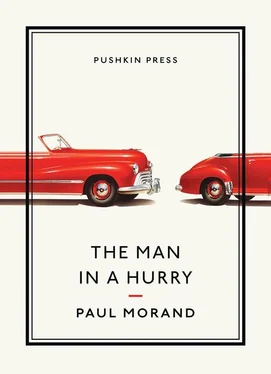But Fromentine, having been squeezing lemons, was rinsing her hands and so it was Hedwige who came down to open the gate.
“Take my overcoat,” said Pierre. “I can just as easily throw it over your shoulders as over mine.”
There was no time switch to light up the staircase. It was lit only by the lamplight on the ground floor, through the stairwell; thus it was the staircase railings that first cast their shadows on the walls and the steps, followed by Hedwige’s tall, slanting shadow, which looked as though it were descending into some caged tomb. “Everything this girl does is wonderful, the entire effect she has on me is astonishing,” Pierre mused.
Once she was downstairs, she threw off the overcoat. What style there was in this provincial ground-floor hall, tiled in black and white, with its Pompeian starkness, and with Hedwige clad in ancient garb, wearing black and white as well, like a steel engraving!
“Let us sit for a moment on this bench”—age unknown, ebony, moth-eaten red velvet—“I feel happy in your house, Hedwige. What tranquillity. Ever since I have known you, I’ve had solemn thoughts.”
“Sad thoughts?”
“Oh no! But I’ve been reflecting. For some time things have been taking a strange turn for me and all paths seem to be steering me towards marriage. And you are the only woman who appeals to me. Give the word ‘appeal’ its most intense meaning.”
He looked at her; she was rubbing her lovely, slender hands together.
“Hedwige, aren’t you going to answer me?”
“I’d like to wait,” she said hesitantly. “I’m not just being flirtatious, you know, but since I feel totally happy here with my mother and my sisters, the moment doesn’t seem right.”
Pierre interrupted her impatiently.
“What moment? I don’t understand; give me a clear answer. Don’t you love me?”
“I don’t know,” she said in the same tone of uncertainty. “I just know that it would upset something were I to love you straight away. Wait.”
“No, I can’t wait! When a beautiful object attracts me in a shop window, I walk in and I take it away with me immediately. I know only too well that it won’t be there the following day.”
Hedwige said nothing and was gazing down at the ground. She was listening attentively to her inner self formulating the reply she would give to Pierre. When she looked up he had disappeared, having performed one of those instant, invisible and silent vanishing acts for which he had the untransmittable secret.
“WELL, TOO BAD. Wait? No. No woman is worth waiting for.”
Waiting was burdensome to Pierre. To him slowness always felt like kilograms, like tons. Whenever he had to slow his pace in the street in order to allow the companion to whom he was talking to catch up, who had dropped a hundred yards behind without Pierre realizing, he felt as though he had suddenly been transformed into a donkey collapsing beneath a packsaddle. Love, too, is a great weight in men’s lives; it’s a handicap. There’s nothing so weighty as the imponderable. The heart is a leaden organ. When a man and a woman meet, they don’t study one another so much as weigh each other up; they know that the day will come when one of them will have to carry the other on his or her shoulders. For a couple is not a lateral bonding, it’s a vertical assembly.
“And now, enough of this business. Let’s get a grip on ourselves. We shall think of something else.”
Pierre considered what his most urgent project was. The Mas Vieux. Take ten days of holiday, go down to the South of France, get the repair works under way…
“Well, it turns out that at a certain moment I did consider marriage; I cast the net: Hedwige happened to be inside it. If the notion of marriage returns at some later date, all I’ll have to do is cast out again. Tomorrow morning, I’ll dash down to the Mas Vieux.”
At the Mas Vieux, for the past four days they have been trellising, mixing cement, repairing the roof, loosening bricks, drilling holes, knocking down ceilings. A stone quarry has been cleared in the forest, where a sawyer and a polisher are cutting up blocks, carving slabs and restoring bits of missing corners, chipped window sills and doorsteps. The embellishments, the handrails, the mouldings have been destroyed; the fountain has been done away with. The garden has given up trying to be an attractive square, relinquished its geranium beds, lost its bower that was the pride of the trellis-maker, sacrificed its lawns for the sake of style, and under the gaze of its new owner is returning to forest. Fences and windbreaks made from roots of heather now cut a dark violet line through the rosemary and wild mimosa. The house looks younger, or rather it grows a century older by the day.
Pierre is doing demolition work; he’s never had so much fun; all day long he hammers, beats, wears out his muscles, and it’s a voluptuous pleasure for him to see the rubble crumbling and watch effect succeed cause immediately. In Paris, hemmed in between four walls with thoughts that were not always pleasant, he had accumulated a potential for bad moods, which he is unburdening himself of here. He is taking out his nervous tension on the house; he uses his pickaxe as a dog uses its fangs. He forgets to have lunch, he spends his life on the scaffolding, he saws against the grain, he holds his hammer the wrong way round, he blunts the axes, he uses the chisel to bring down bits of old wattle that collapse like flaky pastry beneath his blows. When he is exhausted, he stops, adds a few finishing touches to his labours, then, having recovered his breath, he hurls himself at the clay once more and the plaster dust is blown away in a white cloud by the mistral. He treats demolition work as a physical exercise, as a brawl, as an acrobatic act.
He had decided to pull down the old farmyard, which has no animals apart from a horse and three hens and which merely spoils the view. This yard, which adjoins the chapel, was built on the edge of a spur and consisted of four sides around which the outbuildings were situated: hayloft, garage, stable, pantry, hen house and pressing shed. All these had to be “blown up”; what’s more it was “southern” work: bamboo covered with clay and straw mortar, and nothing held firm; a prod with a stick was enough to poke a hole through it. Only the four inner walls of the courtyard still remained standing.
That morning, Pierre was tackling the pointing in the wall by the gable; pickaxe in hand, using three times as much force as was needed, he brought the crumbling plaster down; suddenly he heard the noise of something hard beneath the iron bar.
“Hey! There’s stone down there.”
Some instinct made him dig more gently; throwing down his pickaxe, he began to scrape in small thrusts with a chisel; something black appeared: an old foundation stone? Pierre put his hand down, felt the cold, polished granite surface; his heart beating, he started to dig, clawing away at a crazy speed, his cheek pressed close to the ground, refusing to step back in order to see the whole thing, not allowing himself any conjecture for fear of disappointment.
No, there was no longer any mistake: what was appearing was a granite tambour bursting out of its battered clay plinth. There was the shaft of the column, the top of the shaft, the stone volute that surrounded it and finally the pink marble capital with its sculpted decorations, heads of men or animals that were still intact and most authentically Roman.
Pierre could scarcely believe it. He had been on excavations before, but he had never had anything jump out at him, in a leap of eight centuries, emerging quite untouched, still partly immured, but very much alive. His head was spinning beneath the winter sun and, because he had been staring so intently, his eyes saw nothing but darkness and red stars. Large blisters of water were bursting in the palms of his burning hands, preventing him from taking up his pickaxe again; he spat on his hands, hoisted up his trousers and called to his labourers so loudly that they broke off drinking from their wineskins and ran over to him, convinced that he had discovered treasure.
Читать дальше












